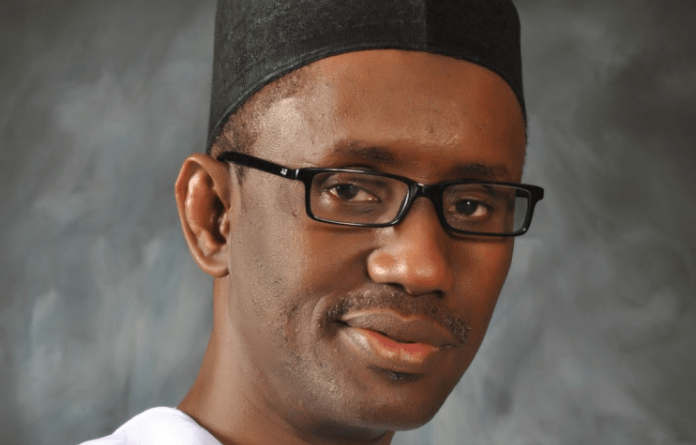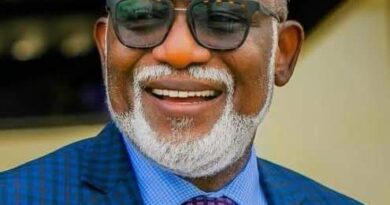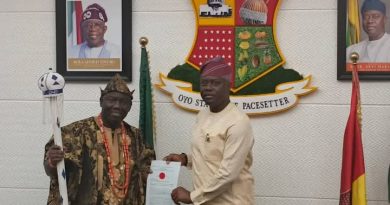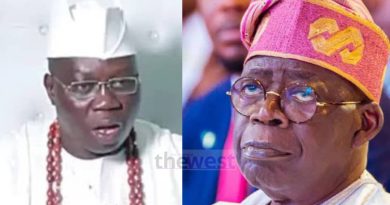Nuhu Ribadu And NSA’s Statutory Mandates
By Yushau A. Shuaib
Recently when President Bola Ahmed Tinubu announced his Special Advisers and named Mallam Nuhu Ribadu as the adviser on security, many were confused if this designation would be the same as that of the National Security Adviser (NSA).
In my previous article titled, “The person needed as President Tinubu’s NSA,” I mentioned that while most past holders of the position were retired Army officers, national security issues are actually beyond the exclusive ken of the military.
Security has evolved to largely encompass developmental issues, which now involves more holistic approaches that could be non-kinetic and essentially strategic in nature, beyond the mere prosecution of armed solutions and deployment of boots on the ground in counter-attack operations.
On the nomenclature of Ribadu’s designation, whether this is as a Special Adviser, a National Adviser or Presidential Adviser, there has only been one Security Adviser in the country, who is also a member of the National Security Council.
Born on 21 November 1960, Nuhu Ribadu was an intelligence police operative, who came to the national limelight as a star prosecutor at the Oputa Panel which was created to investigate human rights abuse during the military era.
He was thereafter Chairman of the Petroleum Special Revenue Task Force (PRSTF) before he became the pioneer Executive Chairman of the Economic and Financial Crimes Commission (EFCC), the agency of the Federal Government tasked with countering corruption and fraud in the country.
Ribadu’s pragmatic approach to intelligence gathering and crime-fighting while in EFCC earned him global recognition and awards, leading to the de-listing of Nigeria from the Financial Action Task Force (FATF) List of Non-Cooperative Countries and Territories, its admission into the prestigious Egmont Group, and the withdrawal of the US Treasury’s Financial Crimes Enforcement Network (FINCEN) Advisory on Nigeria.
Once a visiting fellow at the Center for Global Development, a TED Fellow, and a Senior Fellow in St. Antony’s College, University of Oxford, UK, Mallam Nuhu Ribadu was in exile during President Yar’Adua’s administration, before he returned to the country in 2010 and declared his intention to run for President of Nigeria under the platform of the Action Congress of Nigeria (ACN). In 2011, the retired Assistant Inspector General of Police (AIG) was adopted as the presidential candidate of the ACN, a party sponsored by Asiwaju Bola Ahmed Tinubu.
Before Ribadu’s recent appointment, other former retired police officers had been appointed as National Security Advisers in the country. They included Gambo Jimeta from Adamawa State, during the tenure of Military President Ibrahim Badamasi Babangida, and Alhaji Ismaila Gwarzo (also first DG DSS/SSS) from Kano State, during the period of and then Chief Ernest Shonekan and General Sani Abacha.Yet, a number of retired officers of the Nigerian Army – though never from the Navy or Airforce – have equally held this post, from General Aliyu M. Gusau, to Colonel Lateef Kayode Are (who functioned in the capacity briefly), General Abdullahi Mohammed, General Sarki Mukhtar, General Owoye Andrew Azazi, Colonel Sambo Dasuki, and currently General Mohammed Babagana Monguno.
Unlike many who easily construe the remit of the Office of the National Security Adviser (ONSA) as one coordinating a fighting force on behalf of the government, its essential mandate however consists of intelligence gathering, processing and dissemination towards warding off threats to the wellbeing of the nation. These the NSA does while harnessing the potential of the various intelligence agencies of the country to work together in attaining national security objectives.
It is necessary to point out that the National Security Agencies Act (CAP 278) established three principal agencies: the Defence Intelligence Agency (DIA), the National Intelligence Agency (NIA) and the State Security Service (now known as the Department of State Services (DSS).Section 4 of the National Security Agencies Act, 1986, which disbanded the erstwhile Nigerian Security Organisation and created these three intelligence agencies in its place, specifically empowered the President, as the Commander-in-Chief of the Armed Forces, to appoint a Coordinator on National Security. Section 4(2) of the Act states that: “The Coordinator on National Security shall be a Principal Staff Officer in the Office of the President, Commander-in-Chief of the Armed Forces.”
Similarly, Section 4(3) of the Act defines the roles of the Coordinator on National Security to include advising the President on matters concerning the intelligence activities of the (created) agencies; making recommendations in relation to the activities of the agencies to the President as contingencies may warrant.. and doing such other things in connection with the foregoing provisions of this section, as the President may determine.
Section 1 of the National Security Agencies Decree, 1986 (INSTRUMENT NO. NSA 1) specifically transfers the functions of the Coordinator on National Security to the National Security Adviser.
Therefore, from the foregoing, the primary responsibility of the NSA, who is a statutory member of the Presidency, the National Security Council and the Federal Executive Council is to advise the president on matters concerning intelligence activities and making recommendations to him on issues of national security.
Meanwhile, in response to the challenges of Boko Haram terrorism, the Terrorism Prevention Act 2011, as amended in 2013, was signed into law by President Goodluck Jonathan. The document in its Part I, Section 2(1) states that, “The Office of the National Security Adviser (ONSA) shall be the coordinating body for all security and law enforcement agencies and under this act shall (a) provide support to all relevant security, intelligence, law enforcement agencies and military services to prevent and combat acts of terrorism in Nigeria”, among other tasks.
The Act also gives ONSA the mandate to “ensure the formulation and implementation of a comprehensive Counter-Terrorism Strategy and build capacity for the effective discharge of the functions of relevant security, intelligence, law enforcement and military services.”In line with the foregoing, the former NSA Sambo Dasuki established the Counter Terrorism Centre (CTC) in 2012, which is located in the ONSA and he followed this up with the unveiling of the National Counter Terrorism Strategy Document (NACTEST) in 2014. The soft approach document details the national strategy for the fight against terrorism while allotting tasks to every intelligence, security and law enforcement agencies in the country, alongside other government bodies having any role to play in this battle.The non-military strategy to counter-insurgency was to complement, not replace efforts of troops in fighting terrorism. The soft approach strategy identifies poverty, social injustice, isolation and sectarianism are among the causes of insurgency, while the solutions included prison reform, economic development, peace talks and educating the public.It is necessary to reaffirm the fact that inter-agency cooperation and synergy are central to the objectives of the ONSA.
The Constitution of the Federal Republic of Nigeria (CRFN) 1999, as amended, spells out the roles of the Armed Forces of Nigeria (AFN), the Police and other security and paramilitary agencies in assisting the civil authority to maintain law and order. The Nigeria Police Force is recognised as the lead agency in the maintenance of internal security in Nigeria, as enshrined in CFRN 1999, Section 214. However, the AFN is usually invited to restore law and order where the NPF is overwhelmed.
The Armed Forces Act, the Nigeria Police Act, National Security Agencies Act and the Nigeria Security and Civil Defence Act, among others, further define the roles and administration of these agencies. Therefore, these laws provide the institutional framework for inter-agency collaboration between the AFN and other agencies in internal security operations in the country.
The roles of the NSA, as contained in the National Security Agencies Act, transcends that of the mere coordination of the three major intelligence agencies, as the establishment Act for the office empowers the Adviser to act in such other matters on security as the President and Commander in Chief may deem fit.
The President is empowered by the Constitution, under Section 218 (1) to superintend over all affairs of the armed forces. He is further empowered by Section 218 (2) of the legal ground norm to delegate powers to any member of the armed forces concerning the operational use of these forces. This power, therefore, gives the Minister of Defence or Chief of Defence Staff responsibility over the armed forces on behalf of the Commander in Chief.
The Constitution equally empowers the President or any other minister he may empower, to direct the affairs of the Police in the maintenance of law and other. Therefore, at the discretion of the President, the Inspector General of Police (IGP) reports to him directly or to a minister.In situations of national emergencies, the NSA retains the coordinating power and uses its instruments, resources and other means available to coordinate the activities of security services, including other components of government that are required to bring about stability to the situation.
The NSA briefs the President on the outcomes of operations and in liaison with the various constituents of the national security architecture, advises the President on the next courses of action.At the strategic level, inter-agency cooperation is fostered by intelligence shared at the monthly sittings of the Joint Intelligence Board (JIB) at the ONSA. It is a melting point of intelligence sharing, involving all players in our national security system. This includes the intelligence arms of the armed forces, intelligence agencies, police and other para-military agencies and indeed the heads of key Ministries, Departments and Agencies (MDA) of government that are tasked with the maintenance of law and order.
While President Ahmed Bola Tinubu has named Mallam Nuhu Ribadu, who undoubtedly has acquired the wealth of experience necessary to discharge this remit, as his Special Adviser on security, it remains to be seen if the chosen nomenclature would play any significant role in enabling or restricting his ability to carry out the designated obligations of his new office.
Yushau A. Shuaib is the author of “An Encounter with Spymaster” and “Award-winning Crisis Communication Strategies” yashuaib@yahoo.com




